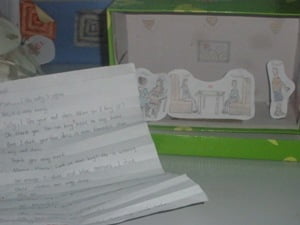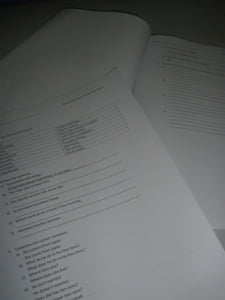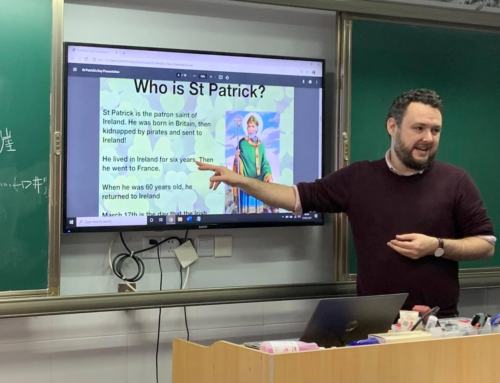So, where I work we are given a strict curriculum to follow for our kindergarten classes, and Hip Hip Hooray classes. We know what vocabulary and what grammar we are expected to teach in that lesson, and all we really have to figure out is how, and the timing for each activity. The homework is provided, and it is a simple job. However, this is not the case for our teenager classes.
Senior classes
Like the Hip Hip Hooray classes, there is a text book, and like all the other classes, there is a cap on how many students you can have in a class, and we have to plan the lessons. That is where the similarity ends. With the teenager classes, we have to look at the material in the text book, and figure out what it is we are meant to be teaching and how. There is a broad general curriculum to follow, but it basically says “Everyday English” or “Past Simple”. Great. There is no set vocabulary or grammar, it is left to us, and our creative devices to come up with it all.
It isn’t as hard as it sounds.  It is actually rather a lot of fun. Yes, you have to follow the textbook broadly, but you have the freedom to bring in other topics, to go off of the set path and make the lessons fun. You can even design your own homework, and projects. We have to write two “Stop and Checks” to make sure that the students have grasped what we are trying to teach them; such as the Past Simple or the correct use of ‘would’ and ‘could’. But again, we write this test, with the final test in mind, and knowing what we have taught the students so far, and in which style we have taught them.
It is actually rather a lot of fun. Yes, you have to follow the textbook broadly, but you have the freedom to bring in other topics, to go off of the set path and make the lessons fun. You can even design your own homework, and projects. We have to write two “Stop and Checks” to make sure that the students have grasped what we are trying to teach them; such as the Past Simple or the correct use of ‘would’ and ‘could’. But again, we write this test, with the final test in mind, and knowing what we have taught the students so far, and in which style we have taught them.
Planning the Lessons
As previously mentioned, we have a wide scope here when it comes to lesson planning. We can make it as much fun as we like, bearing in mind, most teenagers don’t like playing a lot of games as they are at that awkward teenage phase. So you have to conjure up ideas to make everyone feel comfortable, and get everyone involved in the lesson. Boys and Girls!
I really like making the students work in pairs or small groups, as they feel a lot more comfortable, and they are talking to other people in the class, not just their friends. After a couple of lessons like this, everyone knows each other, and there doesn’t seem to be that separation or divide between different groups of friends or boys and girls.
Whilst you are planning the lesson, you have to keep the goals in mind. That you are trying to teach them a specific tense, or all the different ways to ask one question. Neither of these are the most fun things to learn, or to teach, but we have to try to make them fun. This is where project work can be useful.
Depending on the different types of children in the class, choose a topic that they all like – normally movies or music, or something generic and not gender based. Then come up with a project, like diorama’s for them to create, as well as a written script to accompany it. The children have fun in making something, and having something to show for their work. Plus the parents like it as well.
Other projects I have done, have been to set different books for the children to read outside of class, then setting some time aside each lesson to talk about the book, and any vocabulary or grammar they may have found difficult. This is a fun exercise, and helps the children to reinforce what you are teaching them in the lesson. They read different expressions and different tenses, but it’s a fun story. All children seem to like Harry Potter, and I have to admit, it isn’t the worst thing to talk about in class.
Homework
 I have found setting homework tricky. You don’t want to set too much, otherwise the students won’t be able to finish it, and you have to mark it in the lesson, or take it home to mark. I don’t mind taking it home to mark, but do mind taking up a huge chunk of lesson time just to go through it, so you have to think carefully. You also have to think whether it is relevant to what you are teaching the students at the moment. If it isn’t, it might just go to confuse them, rather than helping them understand the point of the lesson.
I have found setting homework tricky. You don’t want to set too much, otherwise the students won’t be able to finish it, and you have to mark it in the lesson, or take it home to mark. I don’t mind taking it home to mark, but do mind taking up a huge chunk of lesson time just to go through it, so you have to think carefully. You also have to think whether it is relevant to what you are teaching the students at the moment. If it isn’t, it might just go to confuse them, rather than helping them understand the point of the lesson.
However, you don’t want to set them so little that it is pointless them doing it. Nor do you want them to be repeating the homework, as they have done it before, and will most likely copy the last homework and resubmit it. Boring for you, and for them. I have asked them to keep diaries, and each topic that I study with them, make them then include it into their diaries. Yes, the entries can become repetitive, but then I suppose I expect that when most of my students only seem to go to school to study, and go to another school before going to bed. Not much time for them to come up with an interesting diary entry, but it is good practice at writing, and the different verbs. Plus they are able to improve each time, due to the corrected mistakes, and that repetition helps them to remember some rules.
Is it easier?
Whilst I find a lot of aspects about teaching teenagers a lot easier, it is also a lot more work. A lot more thought, effort and time has to go into planning and preparation, but I have found that I enjoy the classes a lot more because I have put more effort and time into them. I also like the fact that you can have more conversations with teenagers, and there is more understanding. As the curriculum isn’t as rigid, they learn different questions and different ways to ask them, therefore you aren’t stuck to a script.
I love all of my classes though, but I think I appreciate the teenagers more and it gives me a clearer idea of what a teacher back home would have to do in lesson planning and marking. It allows me to engage my imagination and be really creative.

















Leave A Comment